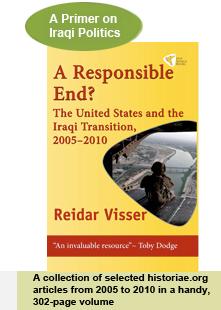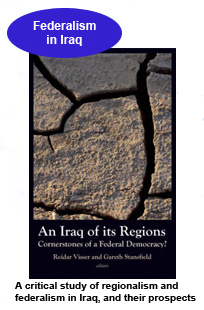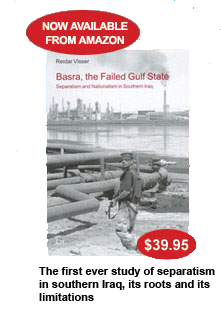



| Main | |
| Documents & images | |
| Links | |
| Contact | |
 | |
| amazon.com |

|
|
|
amazon.com
amazon.co.uk |
|

|
|
|
amazon.com
amazon.co.uk |
|
The Election Law Is Passed: Open Lists, Kirkuk Recognised as a Governorate with “Dubious” Registers
By Reidar Visser (www.historiae.org)
8 November 2009
With 141 votes out of the total of 195 deputies that were present, the Iraqi parliament finally passed a revision of the 2005 election law this evening around 8 PM in Baghdad.
The session was not without drama and at one point was about to derail because of a dispute about whether the five minority seats for Christians should be considered as a single constituency or five different ones! However, despite this, as well as attempt by pro-Kurdish representatives among the Shabak and Yazidis to increase their quotas in the last minute (in the former case against the wishes of other, anti-Kurdish Shabak), each of the amendments was voted on, followed by a separate vote for the whole package.
The broad outline of the revised law has already been known for a long time and contained few surprises as such: Open lists, governorate-level constituencies and minority seats for Christians (5), Sabaeans (1), Yazidis (1) and Shabak (1). In other respects, most features of the 2005 law (including the procedures for allocating compensatory seats, which this time make up 5%) are kept in place. However, two sections of last year's campaigning rules, including the indirect ban on the use of images of (non-candidate) religious leaders, have been included in the revised law for the parliamentary elections through the insertion of a brief reference to the 2008 provincial election law. The law does not specify the exact number of representatives and only says it will follow the constitutional quota according to the latest official statistics (there is no updated census); however it is generally expected that there will be an increase of seats from 275 to around 310. Voting for internally displaced will be based on residence according to the ration-card registers (meaning some will vote where they have sought refuge which is potentially controversial) and for exiles it will be at Iraqi embassies abroad according to procedures established by the Iraqi election commission.
The controversy for the three past weeks has focused on how to hold elections in Kirkuk, where the non-Kurdish population complains that the electoral registers have been tampered with by the Kurdish-dominated local government in the period from 2004 until now, with the aim of securing a Kurdish victory in any future referendum about the inclusion of the city in the Kurdistan federal region. For this reason, Arabs and Turkmens in Kirkuk as well as Iraqi nationalists from all parts of the Iraq have been eager to secure special arrangements that would ensure extra scrutiny in the electoral process in Kirkuk; the Kurds, for their part, have been equally adamant that any special status for Kirkuk would be anathema for them and that they would not support any law that mentioned the word “Kirkuk”.
What was agreed in the end is a compromise that gives something to each side. Kirkuk is indeed mentioned in the bill several times, as an area whose electoral registers are recognised as being “dubious” and therefore should be subject to extra scrutiny in a one-year investigation after the elections, with a possibility of modifying the results. As a result of Kurdish insistence, that kind of arrangement is also enabled for any other governorate whose registers are deemed dubious (and the Kurds will probably try to nominate several other governorates for this status); however Kirkuk is the only such explicitly recognised governorate in the law – which therefore in some ways preserves the “special status” that the Kurds fought against. If any other governorate is to be treated on par with Kirkuk it would need to be demonstrated that it has experienced an annual population growth of more than 5 per cent, and each case must be approved by a simple majority in the Iraqi parliament after a request by more than 50 deputies.
At the same time, this is a highly symbolic and therefore weak kind of special status. Most crucially, the entire reasoning that the initial election result in Kirkuk can be decoupled from the broader debate about Kirkuk’s future is faulty. The future disposal of Kirkuk is likely to be settled by the next parliament whose job it will be to fulfil the promise of a one-off revision of the 2005 constitution; the composition of the next constitutional committee, in turn, may well be influenced by the composition of the parliamentary delegation from Kirkuk. Those seeking to dismiss the significance of the Kirkuk issue in the context of the election law portray it as a “a matter of a couple of seats only”, but the truth is that it does matter whether Kirkuk returns a contingent of deputies broadly supportive of the Kurdish position or whether it includes several representatives with an Iraqi nationalist orientation. Not least because of its expected centrality in the constitutional revision process, there will be a particular focus on how Kirkuk is represented in the next committee charged with handling this issue.
Additionally, in the final version of the bill the process of scrutiny seems first and foremost focused on establishing the correct number of representatives for the governorate, apparently reclassifying any undue “surplus” representatives as “national” ones (although various drafts and press reports differ on this). This leaves the focus on the only other “hard” implication of the arrangements: “That the result should not form the basis of any future electoral process or serve as precedent for any political status before the conclusion of the investigation of the registers.” Which in turn means that the 2010 results cannot be used in an argument about Kirkuk’s future. But in addition to misrepresenting what is actually going to happen (confer the political impact of the deputies that obtain representation next January and will sit for at least one year), this stipulation also ignores the fact that the fate of Kirkuk will be decided either by article 140 of the constitution (which demands a new census, thus making the election result entirely irrelevant), or, alternatively, whatever other solution the next constitutional review committee may manage to come up with.
The parliamentary developments that enabled the Kirkuk compromise to emerge apparently started with rapprochement between the Kurds and those non-Kurdish parties in the assembly that do not seem to worry too much about what happens to Kirkuk: Above all the Islamic Supreme Council of Iraq (ISCI) and the Iraqi Islamic Party (IIP), but more recently also the Sadrists and apparently even Maliki’s State of Law coalition. The Sadrists used to be quite nationalist about Kirkuk, as did Maliki’s party, but yesterday Dafir al-Ani complained that the Daawa had been among the strongest forces in calling for an immediate vote. In a move somewhat reminiscent of the old Kurdish–Shiite–IIP alliance, those groups prepared a revised draft of the law which included the Kurdish demand for other governorates as potential and theoretical candidates for additional scrutiny, and the compensatory seats earlier promised for Arabs and Turkmens were unceremoniously dropped. Baha al-Aaraji, the Sadrist head of the legal committee in the parliament, tried to gather enough deputies for a quick vote before other parliamentarians had had the time to acquaint themselves with the new proposals. In another possible echo of the past, Aaraji also quoted support for Iraqiyya in hammering out the latest proposal; whether this is in fact correct remains unclear (some Iraqiyya deputies have criticised the proposals on Kirkuk from a nationalist point of view), but if true it reflects more or less the same (and rather surprising) constellation that in April enabled the current speaker of parliament Ayad al-Samarraie to replace Mahmud al-Mashhadani who was ousted a year ago (Samarraie mysteriously decamped to Qatar for an official visit only hours before the vote!) Mashhadani was of course a central figure in the nationalist 22 July movement, whose crime it was to care too much about Kirkuk.
Of particular interest, and concern, are the international roles in the settlement of all of this. Without any Iraqi protest being heard, international diplomats and other representatives have been in and out of the Iraqi parliament for the last few weeks, with different degrees of success. To some extent the Americans succeeded in using their influence with the Kurds to change Arbil’s position, and they also seem to have put pressure on (and demanded greater neutrality from) UNAMI, whose early proposals for unclear reasons were more or less identical to the Kurdish ones. However, the US never pushed particularly hard. Into that vacuum was apparently allowed ambassadors representing other countries, including Turkey, Iran and the UK. Frankly, if “multilateralism” and “regionalisation” in Iraq means that the Obama administration is happy to see Iranian and Turkish diplomats and agents crawling all over the place, creating some kind of Turkish–Kurdish–Iranian grand bargain over Kirkuk while Washington jumps into the back seat in its eagerness to secure smooth surfaces as it withdraws, then this is probably not a good sign for those who care about Iraqi territorial integrity. Right now it just does not seem as if the United States fully appreciates the wider regional ramifications – both in terms of stability of the state system in the Gulf and the creation of fertile soil for violent protest movements – of a failure to stand up for Kirkuk as a multi-ethnic, Iraqi city. If the Obama administration is sincere in its commitment to “non-condescending dialogue” with the Arab and Islamic worlds, it is precisely issues like Kirkuk that need to be better understood.
It is an worrying symptom of the degree of external influence in this process that one element of the new law has apparently been lifted almost verbatim from the statement by Ambassador Christopher Hill and General Ray Odierno last week to the effect that “the rules, procedures, and decisions adopted for the January elections should apply only to that election. They should not serve as precedents for future elections or for future political settlements.” The Iraqi version is more logical in that it at least makes it clear that it is “the results” that will not serve as precedents – no one was thinking of using the election law for directly deciding Kirkuk’s future anyway – but one does get the impression that the text may have originated in American circles. Also Hill's comment today that the “elections law should not be used to solve the Kirkuk question”, a thinly camouflaged appeal to those asking for a special status, seems to reflect a misunderstanding of the Iraqi nationalist position. The nationalists never intended to “solve” the Kirkuk issue in this way; rather to them this is about holding elections in an area where large segments of the population deem the election registers to be fraudulent and where the subsequent election results in turn may have an impact on the way Kirkuk will be dealt with in the future. The combination of allegations of fraudulent registers and an ongoing attempt by those accused of orchestrating the fraud at changing the political status of the area does make Kirkuk into a unique case.
Two other entities heavily involved in the settlement of the election law – and now severely tainted by their partiality during that process – are the Iraqi elections commission (IHEC) and the UN agency in Iraq, UNAMI. Had it not been for a little bit of American pressure, it seems both of these factions would have remained entirely on the Kurdish side in the dispute. With regard to the IHEC, its sudden discovery last week of the “loss” of the 2004 registers for Kirkuk (which had been part of the debate over an election law as a compromise solution even before the summer), as well as its rather strained series of arguments that those registers could not be used “even if they were found” are scandalous enough to raise doubts about its ability to do any more business in the Tamim governorate in a neutral fashion. For its part, UNAMI reportedly at one point proposed a compensatory seat for the Kurds in Mosul despite the fact that the Kurdish representation there has never been threatened – another indication that it may not fully comprehend the unique political dynamic of what is going on in Kirkuk.
On the balance, then, despite its many weaknesses as well as the unimpressive numbers (141 out of 275 members in total), it is probably a good thing that this bill passed after all. The open list is unequivocally a step forward for Iraqi democracy and it is a relief that the biggest parties who used to prefer the closed list in the past are now on board with the new system – though one cannot help wondering whether the rather sudden upsurge of speculation about a (re-)unified Shiite list following the visit by Iran’s Ali Larijani may have sweetened the pill considerably for some of these forces, since the prospect of a unified Shiite list would also mean almost unrestricted control by these groups and their allies over the IHEC. Also, Kirkuk is kept on the agenda, maybe in only a symbolic way, but Iraqi voters will have seen which parties are serious about keeping the city Iraqi and which ones are not so interested, and this will make it easier for them to make their choice in a contest where deafening shouts of unspecified dreams of “national unity” abound. As for the prospect of a presidential veto either by Jalal Talabani (because of the special status for Kirkuk) or Tariq al-Hashemi (because the guarantees for Kirkuk may be seen as insufficient), another president – Barack Obama – seemed to try to shoot that possibility down even before the ink on the new amendments had dried: Hours later he declared the new law a “milestone” whose early adoption by the presidency council he looked forward to (10 days is the legal maximum according to the Iraqi constitution).
Alas, to Iraqis, the focus on the election deadlines and getting the formalities right will be a reminder of the same “muddle-through” approach that was seen in Afghanistan recently, where the antics around Abdallah Abdallah’s acceptance of a second round was promptly construed by the Americans as immediately having bestowed full legitimacy on the process. Possibly the hopes and expectations about real change are greater among Iraqis than in Washington with regard to these next elections.
To comment on this article, click here.
Copyright © 2005-2009 historiae.org & Reidar Visser
This document or quotes from it may be freely reproduced as long as www.historiae.org is credited as the original source.
